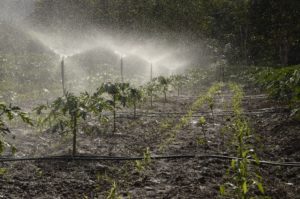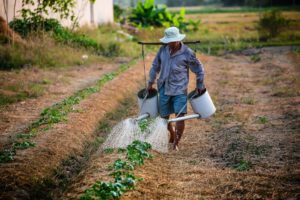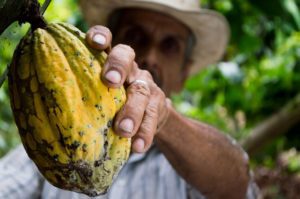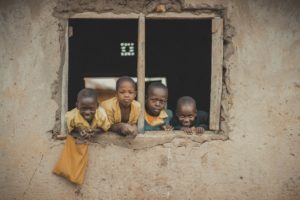Ghana is a multi-party democratic country located on West Africa’s Gulf of Guinea, where it has a tropical climate that exhibits both wet and dry seasons. It is a nation known for its diverse wildlife, old forts, and diverse ecology. In different sectors of the country, there are different crops grown of particular significance to its economy. There are sectors dedicated to growing cotton and tobacco. Other sectors are dedicated to primarily food crops like maize, plantain, cocoyam, and cassava. However, in the forest sector, tree crops including cocoa, palm oil, coffee, and rubber are especially important.

The nation’s economy largely depends on cocoa bean farms as it is the world’s second-largest producer and exporter of cocoa beans. So much so that, approximately 25% of the worlds cocoa supply originates in Ghana. Gold is another integral part of Ghana’s economy due to cocoa’s volatile nature as a result of climate change. Agriculture is threatened by extreme climatic events such as droughts or floods enhanced by climate change1.The effects of change in climate on tropical plants grown there are endangered as farmers find themselves growing little to no cocoa in dry periods.
The Link Between Cocoa and Gold
The cocoa bean industry is inversely correlated with the influx in gold production. When gold prices went up around the year 1992, Ghana’s gold production tripled; cocoa farms began diminishing and quickly became a casualty of unregulated illegal mining. How these two industries coincide is due to the geographical implications of where their products are obtained. Gold ore is typically found in rivers and streams. Due to the nature of gold ores weight, it is quicker and more effortless in obtaining gold through sifting of minerals and rocks in waterways. Identically, cocoa is grown near bodies of water as the plant requires regular watering and humid soil conditions. Because of the necessary environmental conditions, cocoa farms have been a target for gold mining companies like Galamsey.

Who are Galamsey?
Galamsey is Africa’s second largest gold producer who is unregulated and illegal. Galamsey is a word that roots from the phrase “gather them and sell,” which has been known to increase crime rates in Ghana. In 1989, Ghana implemented the Small-Scale Gold Mining Act for obtaining small-scale mining licenses. That is until an updated law stipulated that only Ghanaian citizens could receive mining licenses and permits from the Environmental Protection Agency and Forestry Commission. Since the update, some miners took it upon themselves to hire foreigners and disregard good mining practices and regulations.
The Impacts of Unregulated Mining
Their methods have contributed to erosion, sinkholes, loss of biodiversity, contamination of soil, groundwater and surface water2. Miners are also using toxic chemicals and heavy metals to process stones. Some of the known chemicals include cyanide, mercury, sulfuric acid, and lead. Due to the chemical pollutants linked to Galamsey, many waterways have morphed in color to a gold leaving limited supplies of potable water to farms and village locals. Subsequently, there are land ownership problems, where cocoa farmers can’t stop illegal miners from entering their lands. Most farmers don’t own their lands and if the owner makes the decision to dig for gold then there is no choice but to agree. As climate change and mining has negatively affected cocoa farms, illegal gold mining may seem like a more attainable and lucrative option to locals. Thus, leaving cocoa farms wiped out and in need of vital labor.

Overall, the gold ore mining done by Galamsey has led to widespread destruction in cocoa production and supply. This illegal mining has contaminated potable water, soils, and left farms in disarray, in desperate need for change. This has resulted in not only damage to the environment but the very lives of people who live in Ghana. With contaminated river bodies and limited clean water supply, there are millions of dependent Ghanaians who are struggling to acquire clean drinking water and maintain their livelihood. Let us put an end to gold ore mining companies that don’t care about the very essence of life that sustains us.

How You Can Help
Everyday, the IDEAS For Us: Ghana branch is fighting environmental crisis with boots on the ground initiatives to spread awareness and drive change. Support our Ghana branch by visiting the branch page on https://ideasforus.org/branches/ghana/ and see the 2019 proposals they would like to fund for a productive year of climate action!
Photo credits:
1. https://unsplash.com/photos/SCbq6uKCyMY
2. https://unsplash.com/photos/BpUkWK6hfJA
3. https://www.pexels.com/photo/man-watering-the-plant-during-daytime-162637/
4. https://www.pexels.com/photo/man-hand-fruit-cocoa-50707/
5. https://www.pexels.com/photo/boys-looking-out-on-window-1686465/
Sources Cited:
1.https://journals.plos.org/plosone/article/file?id=10.1371/journal.pone.0200454&type=printable
2.https://www.eoi.es/blogs/mavisasare/2014/01/14/illegal-mining-and-the-environment-–-ghana/
3. https://news.nationalgeographic.com/2018/03/ghana-gold-mining-cocoa-environment/
4. http://ghana.gov.gh/index.php/media-center/features/3187-fighting-galamsey-and-river-pollution-in-ghana
5. https://en.wikipedia.org/wiki/Mining_industry_of_Ghana
6.https://africaupclose.wilsoncenter.org/uncontrolled-and-illegal-galamsey-mining-activities-in-africa-an-increasing-threat-to-water-and-food-security/








